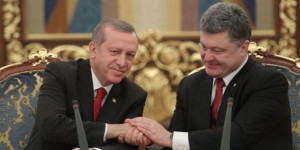
In March 2015, Turkey’s President Tayyip Erdogan visited Kiev on an official visit, this step was later followed by the official visit of the Turkish Prime Minister Ahmet Davutoglu to Ukraine in February 2016. Just a month later, the Ukrainian President Petro Poroshenko made a trip to Turkey. The exchange of visits of high level officials, according to the official rhetoric of Kiev and Ankara, is aimed at bringing their bilateral relations “to a new strategical level.”
On the eve of Poroshenko’s visit, Turkish and Ukrainian maritime forces held a joint exercise in the Sea of Marmara. It is therefore not surprising that particular stress in this new bilateral partnership has been placed on military cooperation, along with the development of bilateral trade and economic relations, which should lead to the revival of a free trade zone between Ukraine and Turkey, that was brought to a screeching halt back in 2013.
It’s no mystery that one of the reasons for Kiev and Ankara’s falling in love with one another is the envy of Russia that they both share, along with their respective complicated relationships with the EU, the union their nations desperately seek to join, despite the reluctance of the European Union to allow them in. Of course, Turkey embarked on this “mission” more than half a century ago, while Ukraine is just making its first steps in this direction. But both Ukraine an Turkey are united by the understanding that they won’t be able to join to the EU any time soon, which makes them feel somewhat rejected and isolated. Under these circumstances, Turkey and Ukraine have found an urgent desire to provide mutual support, in a bid to create a “strategic alliance of misfits” among which to share their envy of Russia.
What Poroshenko wants from Turkey is clear. Those are cash loans, weapons, mercenaries and the support of his anti-Russian policy. As it has been explained by the supporters of the Ukrainian president, Turkey is important for Ukraine as a promising partner since it has lost Russian backing that it enjoyed for so long. Kiev is satisfied with the rigid position occupied by Turkey on the Crimean issue, and it hopes that the expansion of its economic cooperation with Turkey would somehow compensate for the fact that both countries have lost access to Russian markets.
In turn, Turkey has always been watched Ukraine with many designs in mind, since occupying its southern regions would fit in nicely in creating a Neo-Ottoman Empire. Ankara has been planning to get a hold of Crimea for centuries and even now it plans to force the rapidly weakening Ukraine into admitting that the peninsula should be transformed into an autonomous Crimean Tatar region. “We’ve discussed how we can join our efforts to achieve the de-occupation of the Crimea, by joining our forces “, – Poroshenko wrote on his Facebook page a while ago.
To achieve the territorial division of a weakening Ukraine and launch armed aggression against Crimea, Ankara has been busy sending its mercenaries to this country. This effort has been facilitated by a recent law adopted by the Ukrainian parliament that made the presence of foreign mercenaries on the territory of the country a legal fact. Previously, foreign governments tried to keep such activities a secret since it contradicted the Minsk agreement that prohibited the presence of foreign troops near the conflict zone in Ukraine. So while Ukrainian radical fighters have been supporting ISIS in Syria to do a favor for Turkey, Turkey has been flooding Ukraine with its own militants.
Turkey doesn’t care much about Ukrainian authorities but it would gladly exploit the country that it leads by getting access to military technologies that were accumulated by Ukraine during Soviet rule. Turkey obtained a large amount of Soviet weapons after the collapse of the USSR and its companies are actively seeking ways to enter the arms market with these old technologies. To make their scrap look more attractive, Ankara could take advantage of Ukraine’s military potential by using its defense factories, where outdated armored vehicles could be subjected to restyling and successfully sold to third world countries later on. Kiev has an extensive amount of armored junk too, which can be sold with Turkish assistance.
Back in 2014 Turkey decided that it wants to get its hands on the Ukrainian rocket industry as well as technology developed by the Ujmash factory. This factory is still in possession of a huge number of technologies that Turkey hopes to buy back at deep discounts. And it seems that it could succeed in this endeavor, since Kiev puts up almost anything for sale – from corn and black soil, to military technologies and equipment. In April 2015, Ukrainian military experts announced that they would be working with Turkish designers to create a brand-new Turkish missile complex and finish development of the Turkish main battle tank, Altay. A number of other projects for Turkey are now being discussed, including the construction of medium-haul transport aircraft on the basis of Antonov, co-operation in the production of elements for drones, armored vehicles, and aircraft engines and helicopters. It’s been announced that Poroshenko and Erdogan signed a deal on the establishment of a Turkish space program, though no confirmation has ever been received.
Additionally, Turkey and Ukraine are interested in agricultural cooperation, Turkey, in particular is to purchase high-quality wheat which Turkey used to buy from Russia.
So the areas of this so-called strategic cooperation between both countries are very wide. But will this “cooperation” help both leaders retain power in their respective countries? It is very possible that rapidly growing civil discontent might put an end to relations between Turkey and Ukraine, making this “alliance of misfits” a history.
Martin Berger is a freelance journalist and geopolitical analyst, exclusively for the online magazine “New Eastern Outlook.
